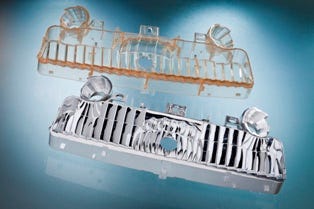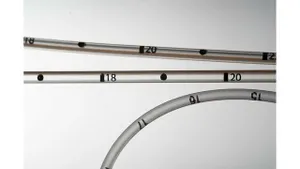Metallized polyether sulfone reflector stands up to the heat
Auto Tier I supplier Delphi (Troy, MI) has recently started to employ a polyether sulfone (PESU) resin from BASF (Ludwigshafen, Germany) for the reflector used in an automotive interior lighting component manufactured using a metallization process.
September 22, 2011
Auto Tier I supplier Delphi (Troy, MI) has recently started to employ a polyether sulfone (PESU) resin from BASF (Ludwigshafen, Germany) for the reflector used in an automotive interior lighting component manufactured using a metallization process.
|
Ease of demolding is a key attribute of the polyether sulfone grade. |
After being injection molded, the complex and highly detailed part is metallized by means of physical vapor deposition (PVD), which is a process with demanding requirements for the plastic. The reflector is manufactured by Goletz GmbH (Kierspe, Germany).
Ultrason E 2010 MR is a PESU resin characterized by its good mold release properties. For this small and complicated part, ease of demolding is especially important. BASF has succeeded in combining a variety of properties in this material: it offers not only excellent mold release characteristics, but as a high-temperature material it also easily withstands a continuous service temperature of 180 deg C, and briefly even 220 deg C. Moreover, it exhibits very good adhesion to aluminum, the material with which it is metallized in this case.
In addition, the plastic is highly transparent, allowing it to be used unmetallized as well. This makes it a candidate for fryer cover applications or other design-oriented household products where this combination of properties and good appearance are a requirement. Therefore, Ultrason E 2010 MR also has the necessary approvals for food contact applications.-[email protected]
About the Author(s)
You May Also Like



